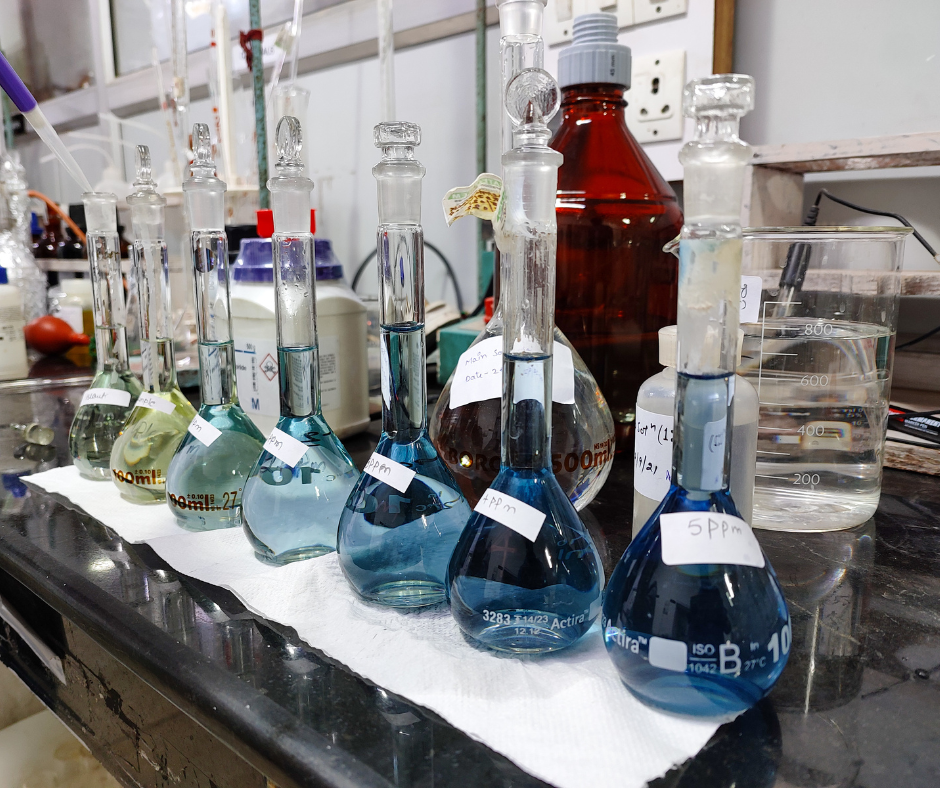Outsourcing chemical manufacturing is a strategic decision made by many companies to leverage the expertise of third-party service providers to produce chemicals on their behalf. Outsourcing chemical manufacturing can provide significant advantages for companies, including cost savings, access to specialized expertise, flexibility, risk mitigation, a focus on core competencies, and innovation. However, it is essential to carefully evaluate potential partners and ensure that they meet the necessary quality, safety, and regulatory standards.
Here are some of the advantages of outsourcing chemical manufacturing:
- Cost Savings
- Access to Specialized Expertise
- Flexibility
- Risk Mitigation
- Focus on Core Competencies
- Innovation
- How can Deskera Help You?
- Key Takeaways
- Related Articles
Cost Savings
One of the main advantages of outsourcing chemical manufacturing is cost savings. Here are some ways that outsourcing can lead to cost savings:
- Economies of scale: Third-party manufacturers often have larger production volumes than in-house operations, leading to economies of scale that can reduce the cost per unit of production. These cost savings can be passed on to the company outsourcing the production.
- Reduced capital expenditures: Outsourcing chemical manufacturing eliminates the need for the company to invest in production equipment, facilities, and personnel. This can significantly reduce capital expenditures and free up resources for other business activities.
- Lower labor costs: Labor costs can be a significant expense in chemical manufacturing. Outsourcing can help reduce labor costs by taking advantage of lower labor costs in other regions or countries.
- Reduced overhead: Outsourcing chemical manufacturing can help reduce overhead costs associated with production, such as maintenance and utilities. Third-party manufacturers often have efficient production processes that can reduce these costs.
- Increased efficiency: Third-party manufacturers are often specialized in chemical manufacturing and have optimized production processes. This can lead to increased efficiency and reduced waste, leading to cost savings.
- Reduced regulatory compliance costs: Regulatory compliance can be a significant expense in chemical manufacturing. Third-party manufacturers are often subject to regulatory compliance requirements and have procedures in place to ensure compliance. Outsourcing production to a third-party manufacturer can help reduce regulatory compliance costs for the company.
Overall, outsourcing chemical manufacturing can provide significant cost savings for companies. However, it is essential to carefully evaluate potential partners to ensure that they meet quality, safety, and regulatory standards and provide the necessary level of expertise and support.
Access to Specialized Expertise
Outsourcing chemical manufacturing can provide access to specialized expertise that may not be available in-house. Here are some ways that outsourcing can lead to access to specialized expertise:
- Chemical manufacturing expertise: Third-party manufacturers often have extensive experience in chemical manufacturing and can provide expert guidance on product development, production optimization, and quality control.
- Process optimization: Third-party manufacturers often have specialized expertise in process optimization, which can help improve production efficiency, reduce waste, and increase product quality.
- Regulatory compliance: Third-party manufacturers are often subject to regulatory compliance requirements and have procedures in place to ensure compliance. They can provide guidance and support on regulatory compliance, helping to mitigate the risk of non-compliance.
- Research and development: Third-party manufacturers may have dedicated research and development teams that can provide expertise in product development, formulation, and testing.
- Technology and innovation: Third-party manufacturers are often at the forefront of technological advancements in chemical production. Outsourcing can provide access to new technologies and processes that can improve product quality and increase efficiency.
Overall, outsourcing chemical manufacturing can provide access to specialized expertise that may not be available in-house. This expertise can help improve product quality, increase efficiency, and reduce risks associated with production. However, it is essential to carefully evaluate potential partners to ensure that they have the necessary expertise and experience to meet quality, safety, and regulatory standards.
Flexibility
Outsourcing chemical manufacturing can provide flexibility that may not be possible with in-house production. Here are some ways that outsourcing can lead to flexibility:
- Scalability: Third-party manufacturers often have the capacity to scale production up or down quickly to meet changing demand. This can provide flexibility and reduce the risk of overproduction or underproduction.
- Access to multiple facilities: Third-party manufacturers may have multiple facilities in different locations, providing flexibility in terms of production location and logistics.
- Customization: Third-party manufacturers can often provide customized solutions to meet specific production requirements. This can provide flexibility and help ensure that products meet the necessary quality and safety standards.
- Risk mitigation: Outsourcing production can help mitigate the risk associated with in-house production, such as equipment failure, natural disasters, or supply chain disruptions. Third-party manufacturers often have contingency plans in place to mitigate these risks.
- Time-to-market: Outsourcing production can help reduce time-to-market for new products, as third-party manufacturers often have specialized expertise and production capabilities that can speed up the development and production process.
Overall, outsourcing chemical manufacturing can provide flexibility that may not be possible with in-house production. This flexibility can help companies better manage production, reduce risk, and respond quickly to changing market conditions. However, it is essential to carefully evaluate potential partners to ensure that they have the necessary expertise, facilities, and processes to meet quality, safety, and regulatory standards.
Risk Mitigation
Outsourcing chemical manufacturing can help mitigate risks associated with in-house production. Here are some ways that outsourcing can lead to risk mitigation:
- Compliance risks: Third-party manufacturers are often subject to regulatory compliance requirements and have procedures in place to ensure compliance. Outsourcing to a compliant third-party manufacturer can help mitigate compliance risks associated with in-house production.
- Safety risks: Chemical manufacturing can pose significant safety risks to employees, the environment, and the community. Third-party manufacturers often have extensive safety protocols and equipment in place to mitigate these risks. Outsourcing production to a manufacturer with a strong safety record can help reduce the risk of accidents and associated liabilities.
- Supply chain risks: Chemical manufacturing often requires a complex supply chain, including raw materials, equipment, and logistics. Supply chain disruptions can cause production delays, quality issues, and lost revenue. Outsourcing to a third-party manufacturer with a robust supply chain can help mitigate these risks.
- Equipment failure: Chemical manufacturing equipment can be expensive to purchase and maintain. Equipment failures can lead to production delays, quality issues, and lost revenue. Outsourcing to a third-party manufacturer with state-of-the-art equipment and maintenance procedures can help mitigate the risk of equipment failure.
- Natural disasters: Natural disasters, such as hurricanes, earthquakes, and floods, can disrupt chemical manufacturing operations. Third-party manufacturers often have contingency plans in place to mitigate the risk of production disruptions due to natural disasters.
Overall, outsourcing chemical manufacturing can help mitigate risks associated with in-house production. Third-party manufacturers often have specialized expertise, equipment, and protocols in place to ensure compliance, safety, and supply chain integrity. However, it is essential to carefully evaluate potential partners to ensure that they meet quality, safety, and regulatory standards.
Focus on Core Competencies
Outsourcing chemical manufacturing can help companies focus on their core competencies. Here are some ways that outsourcing can lead to a focus on core competencies:
- Resource allocation: Chemical manufacturing can be resource-intensive, requiring significant investments in equipment, personnel, and facilities. Outsourcing production to a third-party manufacturer can free up resources for companies to focus on their core competencies, such as research and development, marketing, and sales.
- Specialized expertise: Third-party manufacturers often have specialized expertise in specific areas of chemical manufacturing. Outsourcing to a manufacturer with expertise in a particular area can help companies develop innovative products and improve product quality.
- Efficiency: Third-party manufacturers often have streamlined processes and equipment that can improve production efficiency. Outsourcing to a manufacturer with efficient production processes can help companies reduce costs and improve product quality.
- Competitive advantage: Outsourcing production to a third-party manufacturer with specialized expertise and efficient production processes can help companies gain a competitive advantage in the market. This can lead to increased market share, revenue, and profitability.
- Innovation: Outsourcing production can provide companies with access to new technologies and production methods that can drive innovation. Third-party manufacturers often invest in research and development to improve production processes and product quality. By outsourcing to a manufacturer with a focus on innovation, companies can benefit from these advances without having to make significant investments in R&D.
Overall, outsourcing chemical manufacturing can help companies focus on their core competencies and gain a competitive advantage in the market. However, it is essential to carefully evaluate potential partners to ensure that they have the necessary expertise, facilities, and processes to meet quality, safety, and regulatory standards.
Innovation
Outsourcing chemical manufacturing can also drive innovation. Here are some ways that outsourcing can lead to innovation:
- Access to new technologies: Third-party manufacturers often have access to new technologies and production methods that can drive innovation. Outsourcing to a manufacturer with a focus on innovation can provide companies with access to these advances without having to make significant investments in research and development.
- Collaboration: Outsourcing production can facilitate collaboration between companies and third-party manufacturers. This collaboration can lead to the exchange of ideas and expertise, which can drive innovation and improve product quality.
- Expertise: Third-party manufacturers often have specialized expertise in specific areas of chemical manufacturing. Outsourcing to a manufacturer with expertise in a particular area can help companies develop innovative products and improve product quality.
- Investment in R&D: Third-party manufacturers often invest in research and development to improve production processes and product quality. By outsourcing to a manufacturer with a focus on innovation, companies can benefit from these investments without having to make significant investments in R&D.
- Speed to market: Outsourcing to a third-party manufacturer with specialized expertise and efficient production processes can help companies bring products to market more quickly. This can be especially important in industries with rapidly changing technologies and consumer preferences.
Overall, outsourcing chemical manufacturing can help drive innovation and improve product quality. By outsourcing to a manufacturer with a focus on innovation, companies can benefit from new technologies, collaboration, expertise, and investments in R&D. However, it is essential to carefully evaluate potential partners to ensure that they have the necessary expertise, facilities, and processes to meet quality, safety, and regulatory standards.
How can Deskera Help You?
Deskera's integrated financial planning tools allow investors to better plan their investments and track their progress. It can help investors make decisions faster and more accurately.
Deskera Books can assist you in automating your accounting and mitigating business risks. Deskera makes it easier to create invoices by automating many other procedures, reducing your team's administrative workload.
Deskera also offers a suite of integrated applications to help businesses manage their financials, inventory, and operations. Furthermore, other business aspects such as HR (Deskera People), CRM (Deskera CRM), and ERP are provided by Deskera. These could be crucial and can help short sellers keep track of their businesses and make better decisions.
Key Takeaways
Here are the key points to consider regarding the advantages of outsourcing chemical manufacturing:
- Outsourcing can lead to cost savings through reduced overhead and production costs.
- Outsourcing can provide access to specialized expertise and technology that may not be available in-house.
- Outsourcing allows companies to adjust production capacity and product lines more quickly and easily than building new production facilities.
- Outsourcing can reduce risk by shifting regulatory and safety responsibilities to the third-party manufacturer.
- Outsourcing can free up resources and allow companies to focus on their core competencies, such as research and development, marketing, and sales.
- Outsourcing can drive innovation through access to new technologies, collaboration, expertise, and investments in R&D.
It is important to carefully evaluate potential partners to ensure that they have the necessary expertise, facilities, and processes to meet quality, safety, and regulatory standards. Outsourcing can bring significant benefits, but it is not without risk. Companies must carefully consider their outsourcing strategy and partner selection to ensure that outsourcing aligns with their business goals and objectives.
Related Articles














